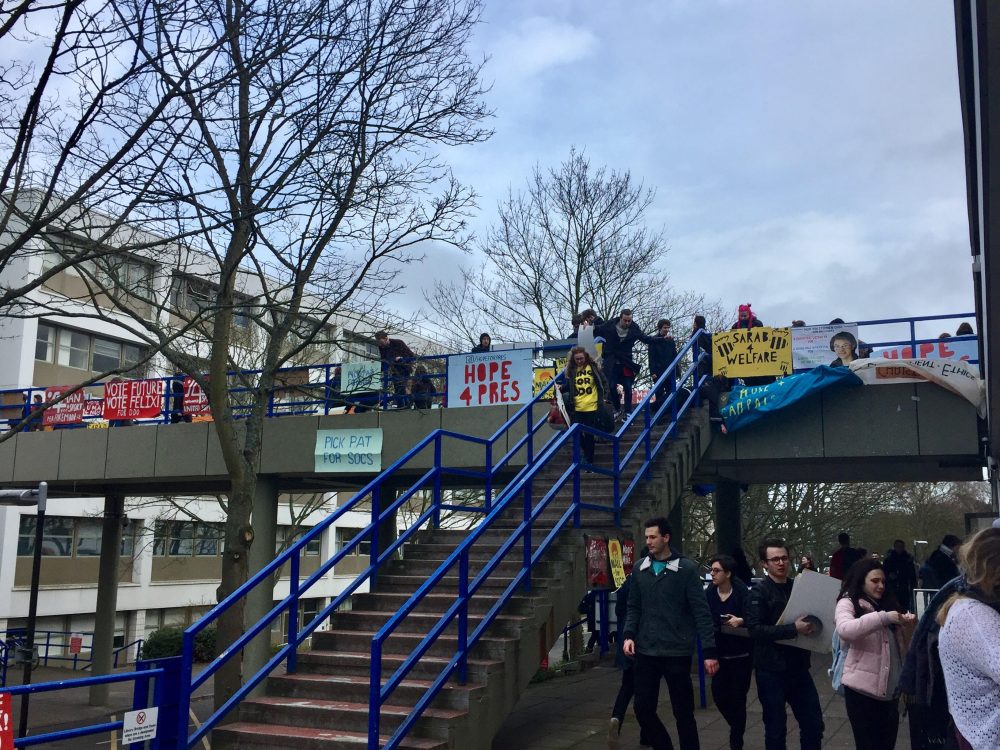This article was written by a writer for The Boar, the student magazine of Warwick University. In return, we sent them back an article written by a Monash student which will feature in their magazine.
With an alumnus that includes two current UK Government Ministers, the Icelandic President, and a former President of Nigeria it is obvious that the University of Warwick would have incredibly active student politics.
From political speakers, to activism and our own SU elections it is hard to be a Warwick Student without a degree of student politics impacting your everyday life.
The most obvious example of Warwick’s participation in politics are the numerous high profile speakers to visit campus. Andrea Leadsome, most notable of those to visit in the 2016/17 academic year, is a current UK Government Minister and a former Warwick student. Her visit in 2017 was amongst the most controversial of the year, with Leadsome being a representative of the right wing Conservative Government that is unpopular amongst students.
A far less controversial guest speaker was the former Green Party leader and Australia native Natalie Bennett. Bennett, a far less controversial figure, shows the huge diversity of Warwick’s political landscape, having had representatives from across the political spectrum.
In addition to Warwick being in tune with the national politicians of the UK, Warwick also has an abundance of its own politics. One of the most notable weeks of the academic year is that of the Student Union elections, whereby the students have the opportunity to vote for who runs their SU.
Seven Student Union Officers are elected following a week of heavy campaigning in the lead up to Easter, each Officer having authority over a particular area of student life, such as societies and sports, with one further elected Student Union President.
The campaign week is unlike any other at Warwick, with students across campus emerging before 5am on Monday morning to find the best spots to put up their campaign materials before campaigning is officially allowed to begin at 8am that morning.
Warwick’s most politically active week is filled with campaigning, canvassing and fighting for votes, with the SU building also hosting a series of debates for each elected position in the SU, something that often gets heated, with candidates trying to one-up eachother.
This may be the most active week in Warwick’s student politics, however, the entire academic year is filled with active student politics.
One of the most heated events of the last year was the occupation of a University building by a fringe left wing activist group within the University, known as Warwick for Free Education.
This group is arguably the most controversial on Campus having been banned from attending the societies fair in 2016.
In November and December last year Warwick for Free Education staged a sit in protest and occupation of a new conference building on campus, protesting against Warwick’s involvement in higher education reforms and against a court injunction taken out following the societies involvement in a similar (but violent) occupation in 2014.
The groups did succeed in some of their aims, stating on their website that they caused ‘serious financial disruption’ to the University and also managing to get the injunction scrapped.
The ending of this protest also owes largely to the SU, who played a significant role in bringing both Warwick for Free Education and University representatives to the negotiating table.
Finally, the final term at Warwick saw many representatives take part in the National Union of Students conference in Brighton, on the south coast of England.
This conference is a coming together of representatives from Student Union’s across the country to vote on a series of motions for the National Union of Students to work on and also elect the leadership of this Union.
Representatives of Warwick’s SU are elected as delegates during the same week as the SU elections and are there to be the representative of Warwick’s voice within this national union.
The 2017 conference saw one of the more controversial figures standing, Tom Harwood, a centre-right Durham student, who wished to make the SU less hostile to non-left-wing beliefs.
Harwood received votes from several of the Warwick delegates at this conference, however, failed to break the mould of left wing NUS Presidents, receiving just 35 votes, compared to the eventual winner Shakira Martin’s 402, showing just how hostile student politics in the UK can be to centre-right beliefs.
Warwick has one of the most active and engaging political landscapes of any UK Universities and with the controversial Prime Minister Theresa May in power and the fears of Brexit looming, it is clear that this highly charged political environment is unlikely to change any time soon.



